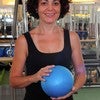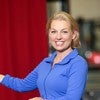Description
About This Video
Transcript
Read Full Transcript
Welcome. I'm Curia, I'm director of Fletcher Paul Audience. And in this tutorial we'll be going through a series of mounts and dismounts on the reformer. Ron developed a sear amount and a dismount for each piece of movement. And the reason he did that is to prepare the body, um, but also to focus the mind and to give us the sense that it wasn't about the exercise, but it was about the whole movement program. So what he called the Gazintas, this goes into, this, goes into, this, goes into this for the transitions are, are just as important to the, as the exercise for going into.
And so we'll give you a sampling of some of the amounts and dismounts that Ron taught. And I was delighted to see in the tribute to Joseph Palladio's, the recent movie documentary that was just created. That show also had a way to approach the machine in each exercise. Um, I haven't really heard that emphasized by many of the people who studied with, with directly with Chow. Um, but he felt that it was very important to also to prepare the body, um, before we actually approached the machine. So one of the things that drove, uh, Ron crazy and um, drive several of his teachers crazy is what he called schlepping on the machines. So when you just sort of get on the machine haphazardly and so Claudia is going to show schlepping on the machine that would be a no on a Fletcher studio. So, um, to prepare the body for any sort of the supine exercises like and footwork, um, feed in the straps, hands in the straps. I'll give you a couple of options as to how we might get on and off the machine. So the first thing she does is, is really prepares the body and standing and centering.
So she's thinking about her alignment from her feet all the way up through the crown of her head. And then she'll take four [inaudible], which is basically standing leg and foot work. Think of folding in the hip and opening the hip, keeping the spine long. Last one, play and contract a sash. And then from here seeded contractions contracting. Rounding through the lower back, lengthening, ah, and contracting back and lengthening up two more times.
Contracting back.
Rotating to the right. Shh. Drawing the legs in from a contraction and extending through. Circle the arms up and shoot forward two sets of pulses here again to open up the lower back. Sure.
Extend the legs out to a teaser position and then swivel off the machine and roll to a standing position. And then another way she might dismount from that same position. Go ahead and play to set and try the right arm up and around.
Just on two breaths. This time from here, extend the legs up to a vertical position. Separate the legs slightly wider than the machine and place the feet down on the floor. So this is a nice position because it opens up the hips, but it also, um, really emphasizes the imprinting of the spine. From here, she'll lift the arms up, coming into Abra contraction. Shh. And again, peeling forward rounding for words. Do two sets of pulses and rolling up with arms. Open the arms out to second. Let's come up and over to the left Shin reaching here.
Reach two, three, six, seven and open up right arm owl and sweep around. And again, reach two, three, four, five, six, seven and open and around and reach two, three, four. So this would be a lovely transition. You could give she several exercises and around lift up and place the hands lift up and circled back, left arm and circle forward up and back to place. So gathered through here and as she plays the elbow, she'll go into a high release, hinge forward and hinge. Shh. Inhale High, release him [inaudible] for two more times, bending through the upper back, folding in the hips last time and hit forward and high release contract back, draw the left leg up and over the machine and come around and roll to a standing position.
Yeah. And just lift the arms up and press down. So those would be two examples of dismounts from the supine position. There were many, many more. Ron was constantly creating throughout his career, up to 90 and um, and developing different ways to approach the machine. He felt that we shouldn't always do every exercise in the same way.
So, even though the intention was, was to work the body, um, from a place of depth and, and oftentimes really understand the order of exercises and the way Joe set them, um, he felt that once we understood that we should play with the move on event. Um, this next mount is for the stomach massage, um, and an involves straddling the machine, um, as, as many of Franz pieces did. And the, the amusing thing about straddling the machine is that the first time, um, Ron was asked to straddle the machine. He was working in a session with Clara Palladio and she was standing on one side of the machine and he was on the other and, and she asked him to give, uh, to give her his leg. And, um, he was sort of frozen because Joe said never straddle the machine. And so that was a rule on the studio, never to straddle the machine. And I don't know why that role was, some people say that Joseph didn't have that flexibility. I doubt that. Um, but anyway, so Ron was, was sort of frozen in place and Clara eventually said, Joe's not here.
Straddle the machine. And so from, from that day we developed a whole series of, of straddling the reformer and this is one of them. So I'll ask Claudia to circle her arms out to the side to place the hands on the foot bar and the draw the inside, like up and over the machine and straddle the machine. So from here she's in a wide second position. She's pulled up through her center. Take a full breath into your hinge. She inhale center. Exhale, contract that.
Inhale, lift off. Exhale, inhale, center. And that, just watch that extension lift and, and she better, ah, can contract that. Lift up, hinge forward. Hold the hands, reaching the arms out to the side and pulse the hinge from the hips. Two, three, four, five, six, seven. Circle the arms up and back to the mat. Contract. Extend the legs out the flex. Bend the legs, circle the arms up, and you're in the stomach. Massage position. Lift the heels up.
And then from here, let's lift the left arm up and circle it back to the shoulder rest and lift up. Circle back to the shoulder. Breath, take a breath to length in the spine. Shh. And then circled both arms up and reach the arms forward. Lift up, circle back to the match. And again, lift circles forward. Come up and touch the mat.
Shh. Contract back, extend the legs out, draw the legs together. Swivel and again, roll to a standing position. This next mount is amount to the new stretch series. Oftentimes we combine the new stretch with the abstracts and then of course the AB stretch goes into arabesque and all sorts of other pieces. Um, so we'll just give you an idea of how we might match, um, for, for this series of movements. So again, first Claudia will circle the arms, place the hands, shoulder with the part, and then she places the inside foot against the far shoulder, breast outside fudge. Good. And starting in the contract and position. Good. And try the knees a little closer together and let, let's just start, uh, from here, sit back towards your heels cause so we'll do a kneeling plea. I inhale, open the hips and exhale, fold and again, open and fold.
Two more times. Shh. Last time. Open the hips and fold back. And then from here, a circle, the arms and can or forward. So what oftentimes happens with the knee stretch is, um, we find that the clients for their participants start here and they really don't have a lot of range of motion and they end up shifting through the spine. So to start the knee stretch back here and we think of there being about a fist distance between the hips and the heels and a deep contraction.
So keeping the pelvis here, I'll ask her to lengthen her spine out to a long flat back.
So to find this fold in the hips and the length through the lower back. Inhale, bend the legs, play keeping the bend of the legs, rotate the pelvis, and then straighten the legs. Think of lifting up through the inner thighs. Inhale, bend and rotate the pelvis and straighten. So it's a bend. Rotate the pelvis. Then keep that rotation. Straighten, lengthen the legs and gathered the ribs. One more time. Bend Pelvis and think of pressing the pelvis up through your midline.
Good. And then release the right leg to the outside of the machine. That said, circle the leg around to arabesque. So then we could do a whole series here. The dismount from here would be to thread that leg under the left, open the hip, open the chest, and then draw the legs together in contraction and roll up through the spine.
So she sent a seated fourth position and the tendency in this position is to allow this hip to lift up. So we're first going to actually press this hip forward and then reach the hip down to the mat and again, press forward and reached down two more times and down. Tried to get a little more length through the waistline each time. Nice. Claudia and press and rage. And then she'll reach her left arm out to the side, keeping the hip down, using the spine. She presses away into a side bend,
Last time bend and extend. Circle the left hand, the lower back, keeping the rotation. So rotate back to the bar and circle the left hand to the lower back. You got it? Sure. And Bend and extend and again bend and extend.
So there's a lot going on in this piece, that anchoring of the pelvis, the rotation through the spine, the unilateral work through the body. This time bend, venture, elbow. And as you extend, rotate the chest and your focus to the ceiling, press out so you move the carriage. Yeah. So come back into your rotation, come all the way in. And so press out with the arm and the press rotates the focus to the ceiling, shaping the back flat and then rotate to the bar and rotate to the ceiling. No extension through here. That's it. And rotate and, and, and focus to the ceiling.
Sweep the left arm down, up, and come back to the back diagonal. So the sweep this left arm up and come to the back. Diagonal. Inhale, lift. Inhale, twist. Exhale, left-hand circle and live center. Then the hips and [inaudible] the hit first and shut center hip and that's it. And back I ag and all. Nice.
And lift him and play and circle up and around. Beautiful from here's the dismount. So she reaches the arm and leg out to form a diagonal line. She crosses the leg down to the floor, lifts up into a pos. Se position, lowers the leg as she lengthens the body.
Up this next mount and dismount is to transition from one side of the machine to the other. Um, so this could be used for scooter. It can be used for Eve's lunge if you, um, teach those pieces of movement. But instead of having to walk around from one side to the other, it's a rather advanced transition, but it's also fun. So, um, try it. She'll stand alongside her partner, Ron called the piece of equipment, the partner and she'll again circle the arms around, place the hands on the foot barn and she, she'll draw the right leg up and over the machine and come again down to that second physician. So in the second position, we want to be sure that the hips, the knees and the ankles and the feet are all on the same line and the back is lengthened. So from here she'll do plays, which um, the challenge is not to shift the body forward, but to lift straight up from here. It's an inhale to lift, very small play. It's a wider machine than you're used to and lower and again, straight up. That's beautiful.
Paul and Lauer two more times. Lift and lower. Nice. Claudia. And notice how she's maintaining the organization through here. This is not easy. And then lift up, shift to the right and circle the left leg up at a round. Good. So this is called an attitude position. Good.
The leg is parallel to the floor and then she'll pulse the leg back. Pulse two, three four by six, seven full breath to extend the leg and a full breath to circle across and come straight down and play. Ah, and lower ca and lower. Two more times up. Last time. Lift and lower. Lift up, shift to the left and draw the leg around and pulse.
One I call it crossed over the other. Circle the arms and reach for the straps and roll up with the straps. So then we could go through a whole series of movements here. Can tract forward placing the straps, circle the arms up and Brown, lift the legs open to a vague, shot the legs together in parallel and then circle off the machine. And again, roll to a standing position and all the way up. Alright.
So this next piece is I'm a shoulder roll mountain dismount. It can be used for, for all of the supine pieces, but it's usually used for the control balance on the, on the, on the reformer. Um, so Claudia will start with a very simple mount for this exercise.
She wants to her head to be out of the shoulder rests for safety reasons because otherwise the net could get caught. Yeah. Um, which would not be good. So she extends the legs up to the ceiling. She rolls so over, she separates the legs to a v and places the feet on the outside of the machine. And our machines are a little narrower. So, um, feels slightly different to her, but I think it's, it's doable. Then she goes into the control balance.
And as you lower the left, lift the right. Nice. Should to more stabilizing the shoulders. Shed last one. And then we'll do the shoulder roll dismount.
We might mount on the left to bring more balance to the body and also more, more balance to the mind. So thank you very much. And, um, I hope you'll enjoy some of these trends sessions.
Comments
You need to be a subscriber to post a comment.
Please Log In or Create an Account to start your free trial.













